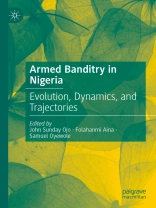In Nigeria, armed banditry has emerged as a contemporary threat to national security. Commentators and scholars have repeatedly pointed to overlapping foci such as herders-farmers’ conflicts, warlordism, ungoverned spaces, transnational criminal networks, and the proliferation of Small Arms and Light Weapons (SALW) from Libya as dynamics influencing the current security dilemma in Nigeria. The emergence of armed banditry has triggered the prevalence of everyday killings, kidnapping for ransom, property destruction, and cattle rustling. However, the group’s origin remains obscure, while its objectives and organizational structure are fuzzy.
This book aims to unravel the evolution, dynamics, and trajectories of armed banditry in Nigeria. As it explores the activities of armed banditry in Nigeria, the debate will focus on its historical context, socio-economic consequences, transnational dimensions, and the response to armed banditry in Nigeria. Furthermore, the book will explore whether the scourge of armed banditry represents a new terrorist organization with a distinct ideological orientation (if at all) or another non-state armed group creating and profiting from a criminal economy through the reign of terror. In response to the increasing concern for the criminal activities of armed banditry in Nigeria, the book anticipates unpacking its emerging trends and operational nomenclature.
Tabla de materias
1. Introduction – John Sunday Ojo, Fola Aina and Samuel Oyewole.- Part 1: The Causes and Characters of Armed Banditry.- 2. Climate Change and Armed Banditry in North-West Nigeria: A Synergy of Convenience – Oluwole Ojewale and Jumoke Ayandele.- 3. Borderless Criminals or Comrades in Commune: The Transnational Dimension of Nomadic Armed Banditry in North-West – John Sunday Ojo and Fola Aina.- 4. Monetizing Peace, Boundless Bargaining or Fragile Truce? Armed Banditry, Circular Economy of Kidnapping, and the Politics of Transactional Security – Femi Philip.- 5. Fulanising Armed Banditry in North-West Nigeria: Towards a Criminalisation of an Ethnic Identity – Siddique Abubakar.- 6. Armed Banditry and Arms Trafficking in Northwest Nigeria – Ilufoye Sarafa Ogundiya and Titus Utbie.- Part II: The Consequences of Armed Banditry.- 7. Unveiling Northwestern Nigeria’s Armed Banditry-Induced Humanitarian Crisis – Fola Aina and John Sunday Ojo.- 8. The Convergence of Chaos: Is Armed Banditry Terrorism in Disguise? – Oluwole Ojewale and John Sunday Ojo.- 9. Masking the Reign of Terror in Nigeria: Armed Banditry and State Complacency – AI Chukwuma Okoli.- 10. Armed Banditry, Nigerian State, and the Politics of Framing Terrorism – Charles E. Ekpo.- 11. Armed Banditry and its Impact on Food Security – Samuel Oyewole and Titus Utibe.- 12. Armed Banditry and its Effect on Human Capital Development in Northwest Nigeria. – Seun Bamidele.- 13. Gendered Dimensions to Armed Banditry in Northwest Nigeria: Livelihood and vulnerability – Maryanne Iwara or Jumoke Ayandele.- Part III: Controlling Armed Banditry.- 14. Nigerian State and the War Against Armed Banditry – Kazeem Lamidi.- 15. ‘Yan Sakai Vigilantism and Community Response to Armed Banditry in Nigeria’s North-West – Murtala Rufai and James Barnett.- 16. Negotiating Peace or Peace on Trial: Armed Banditry and the Cacophony of Blanket Amnesty – Gbeke Adenuga.- 17. Conclusion – John Sunday Ojo, Fola Aina and Samuel Oyewole.
Sobre el autor
Samuel Oyewole is a lecturer at the Department of Political Science, Federal University Oye-Ekiti, Nigeria. His research interests cover African affairs, military and strategic studies, crisis management, and development studies.
Folahanmi Aina is an international security analyst and researcher. He completed a second Masters’ degree in African Studies, at the University of Oxford, having earlier obtained a Masters’ degree in International Development Policy from Seoul National University, South Korea. He is currently completing a doctorate degree in Leadership Studies, with reference to security and development at King’s College London.
John Sunday Ojo is a doctoral researcher at the Jimmy and Rosalynn Carter School for Peace and Conflict Resolution, George Mason University, USA












